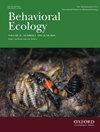寄主大小对松毛虫后代性别和存活率的影响
IF 2.2
3区 环境科学与生态学
Q2 BEHAVIORAL SCIENCES
引用次数: 0
摘要
寄生幼虫消耗宿主以获得发育所需的营养资源。寄生蜂可以根据幼虫可消耗的生物量,通过产下未受精卵和受精卵来选择寄主的大小。然而,寄生蜂最终可能会在最佳体型范围内遇到宿主可用性低的情况,从而影响其后代的生存。在本研究中,我们发现在同一研究地点,所有可用宿主(Leucauge volupis)的体型都小于之前观察到的被 Pinheirensis Hymenoepimecis 寄生的宿主。因此,我们研究了这些寄生虫如何绕过理想寄主稀缺的问题。雌蜂偏向于向最大的 L. volupis 雌蜂产卵。在这种次优情况下,它们不会只产下未受精卵,这些卵会发育成相对较小的后代(雄性)。在这种情况下,它们主要将受精卵产在较大的蜘蛛身上。幼虫死亡率很高,但附着在较大蜘蛛身上的幼虫更有可能完成发育。总的来说,松毛虫雌性能够选择最好的宿主,但却不能延迟受精卵的产卵时间或避免后代死亡。在此,我们讨论了造成寄生蜂及其寄主生命周期不同步的潜在原因、最佳寄主的可用性,以及这些因素可能对其种群产生的影响本文章由计算机程序翻译,如有差异,请以英文原文为准。
Effects of host size on progeny sex and survivorship of Hymenoepimecis pinheirensis
Parasitoid larvae consume their hosts to obtain the nutritional resources required for their development. Parasitoid wasps can optimally select the size of their hosts by laying unfertilised and fertilised eggs according to the amount of biomass available for consumption by the larvae. However, parasitoids may eventually experience low host availability within the optimal range of body sizes, affecting the survival of their offspring. In this study, we identified a situation in which all available hosts (Leucauge volupis) were smaller than those previously observed to be parasitised by Hymenoepimecis pinheirensis at the same study site. Therefore, we investigated how these parasitoids can bypass the scarcity of ideal hosts. Female wasps biased their oviposition toward the largest L. volupis females available. In this suboptimal scenario, they did not oviposit only unfertilised eggs, which developed into relatively small offspring (males). In this situation, they lay fertilised eggs mainly on larger spiders. Larval mortality was high, but the larvae attached to the larger spiders were more likely to complete their development. In general, H. pinheirensis females managed to target the best hosts available, but could not delay the oviposition of fertilised eggs or avoid offspring mortality. Here, we discuss the potential causes of asynchronies in the life cycles of parasitoid wasps and their hosts, the availability of optimal hosts, and how these factors may affect their populations
求助全文
通过发布文献求助,成功后即可免费获取论文全文。
去求助
来源期刊

Behavioral Ecology
环境科学-动物学
CiteScore
5.20
自引率
8.30%
发文量
93
审稿时长
3.0 months
期刊介绍:
Studies on the whole range of behaving organisms, including plants, invertebrates, vertebrates, and humans, are included.
Behavioral Ecology construes the field in its broadest sense to include 1) the use of ecological and evolutionary processes to explain the occurrence and adaptive significance of behavior patterns; 2) the use of behavioral processes to predict ecological patterns, and 3) empirical, comparative analyses relating behavior to the environment in which it occurs.
 求助内容:
求助内容: 应助结果提醒方式:
应助结果提醒方式:


